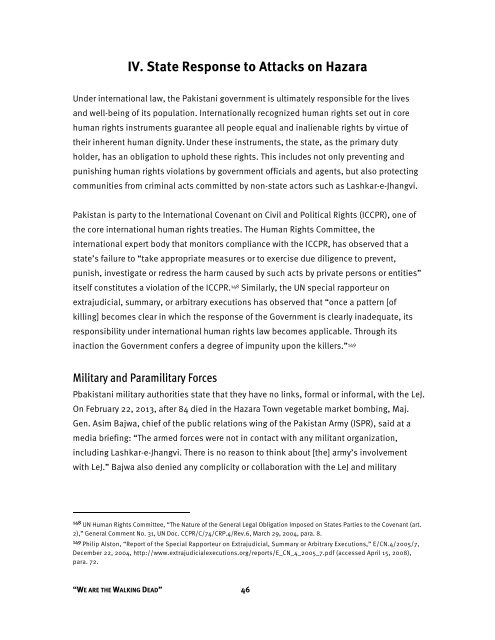pakistan0614_ForUplaod
pakistan0614_ForUplaod
pakistan0614_ForUplaod
You also want an ePaper? Increase the reach of your titles
YUMPU automatically turns print PDFs into web optimized ePapers that Google loves.
IV. State Response to Attacks on Hazara<br />
Under international law, the Pakistani government is ultimately responsible for the lives<br />
and well-being of its population. Internationally recognized human rights set out in core<br />
human rights instruments guarantee all people equal and inalienable rights by virtue of<br />
their inherent human dignity. Under these instruments, the state, as the primary duty<br />
holder, has an obligation to uphold these rights. This includes not only preventing and<br />
punishing human rights violations by government officials and agents, but also protecting<br />
communities from criminal acts committed by non-state actors such as Lashkar-e-Jhangvi.<br />
Pakistan is party to the International Covenant on Civil and Political Rights (ICCPR), one of<br />
the core international human rights treaties. The Human Rights Committee, the<br />
international expert body that monitors compliance with the ICCPR, has observed that a<br />
state’s failure to “take appropriate measures or to exercise due diligence to prevent,<br />
punish, investigate or redress the harm caused by such acts by private persons or entities”<br />
itself constitutes a violation of the ICCPR. 148 Similarly, the UN special rapporteur on<br />
extrajudicial, summary, or arbitrary executions has observed that “once a pattern [of<br />
killing] becomes clear in which the response of the Government is clearly inadequate, its<br />
responsibility under international human rights law becomes applicable. Through its<br />
inaction the Government confers a degree of impunity upon the killers.” 149<br />
Military and Paramilitary Forces<br />
Pbakistani military authorities state that they have no links, formal or informal, with the LeJ.<br />
On February 22, 2013, after 84 died in the Hazara Town vegetable market bombing, Maj.<br />
Gen. Asim Bajwa, chief of the public relations wing of the Pakistan Army (ISPR), said at a<br />
media briefing: “The armed forces were not in contact with any militant organization,<br />
including Lashkar-e-Jhangvi. There is no reason to think about [the] army’s involvement<br />
with LeJ.” Bajwa also denied any complicity or collaboration with the LeJ and military<br />
148 UN Human Rights Committee, “The Nature of the General Legal Obligation Imposed on States Parties to the Covenant (art.<br />
2),” General Comment No. 31, UN Doc. CCPR/C/74/CRP.4/Rev.6, March 29, 2004, para. 8.<br />
149 Philip Alston, “Report of the Special Rapporteur on Extrajudicial, Summary or Arbitrary Executions,” E/CN.4/2005/7,<br />
December 22, 2004, http://www.extrajudicialexecutions.org/reports/E_CN_4_2005_7.pdf (accessed April 15, 2008),<br />
para. 72.<br />
“WE ARE THE WALKING DEAD” 46


